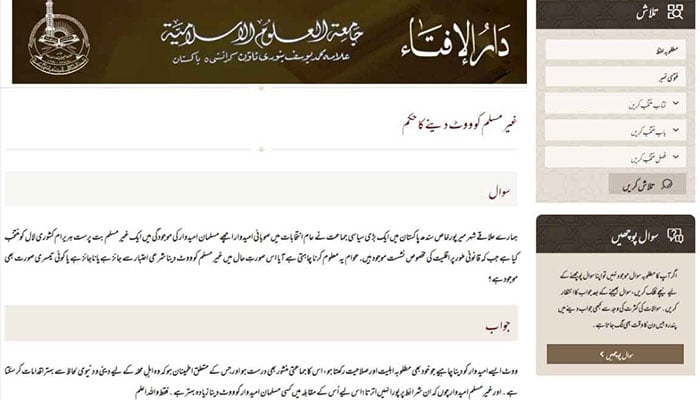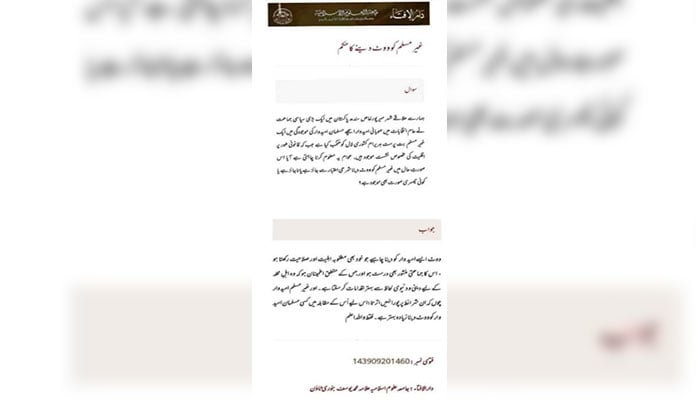Fatwa against voting for non-Muslim candidates fuels concerns among minorities
Jamia Binoria's decree advises people against voting for non-Muslim candidates for them not living up to required standards
With February 8 polls less than a month away, disturbing, and hateful content has started circulating on social media platforms targeting religious minorities.
A fatwa — a legal ruling by Islamic scholars — issued by a Karachi-based seminary earlier in the day, regarding minority candidates resurfaced on Facebook and X platforms suggesting voters prefer Muslim candidates over the ones belonging to minorities.
The fatwa was issued by Jamia Uloom Islamia, New Town, famously known as Jamia Binori Town, which is located near the Guru Mandir area.
The religious school is considered one of the most influential seminaries in the city.
Chaman Lal, a minority rights activist, shared an image of the undated decree on Facebook stating: "A Fatwa is issued that, it is permissible to take votes from the population of more than one million minorities, but Today a fatwa has been issued that it is not permissible to vote for minority candidates in the general election."
The Fatwa was released after the query: "Is it permitted under Islamic laws to vote for a non-Muslim candidate?"
The query further added that a major political party had nominated a Hindu for the general seat in the presence of a better Muslim candidate even though there were reserved seats for non-Muslims.
"The public wants to know whether voting for a non-Muslim in this situation is permissible or not from the Islamic point of view, or is there a third option?"
In response, the fatwa said: "The vote should be given to a candidate who has the required qualifications and ability, his party manifesto must also be correct and about whom there's satisfaction that he can take better steps for the people of their constituency, religiously and secularly. And because the non-Muslim candidate does not live up to these standards; it is better to vote for a Muslim candidate."
When was the fatwa issued?
This scribe also checked the website of the seminary to verify the document. It was confirmed that the fatwa was issued and was available on the portal under the ID: 143909201460. When called, they shared that the decree was issued five years ago but couldn't give the exact date.
However, the URL of the online copy of the fatwa shows July 19, 2018, as the publishing date.
It means that the said fatwa was issued before the July 2018 polls when the PPP had awarded a ticket to Hari Ram Kishori Lal from PS-47 (Mirpurkhas-I) which he won.
This time around the party has fielded him again from the same constituency which is now PS-45.
'Pakistan is still stuck in religious issues'
Commenting on the matter, Chaman Lal lamented: "When the constitution has given equal rights then those people who have worked for the betterment of their area and are willing to work more for the people of Pakistan, then why shouldn't people cast their votes in favour of them even if they belong to minorities?"
"The world is running after technology while Pakistan is still stuck in religious issues — which is no doubt important but it is a personal matter. When it comes to the state then good candidates should come forward even if they belong to a minority community," he added.
It must be noted that Geo.tv tried to reach Jamia Binori Town for comment regarding the fatwa, its currency, and its repercussions without success.
-
Security forces gun down 30 terrorists in multiple IBOs in KP: ISPR
-
MQM-P calls for new province in Sindh
-
US report validates Pakistan military edge over India: PM
-
Banned TTP poses serious threat to Pakistan security: UNSC panel
-
CM Afridi clarifies remarks on by-poll after ECP requests army deployment
-
Dubai sees 3.2m Pakistani passengers in 2025 as airport sets new milestone
-
Security forces kill 23 Indian proxy terrorists in KP's Kurram
-
Pakistan to construct island to boost oil exploration: report













